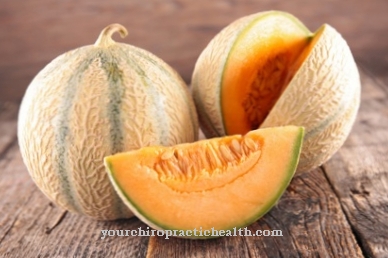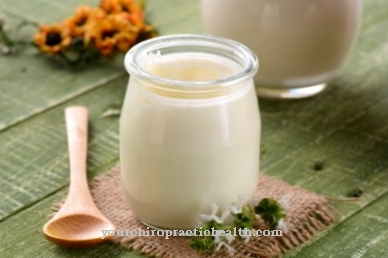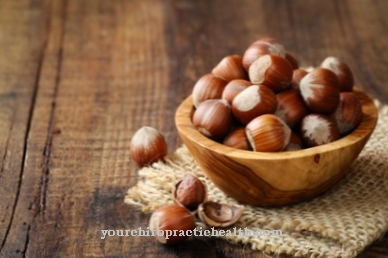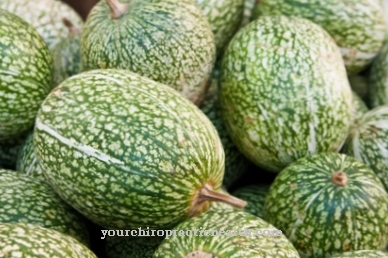The Jerusalem artichoke is the potato for diabetics. It is starch-free and low in calories, at the same time it provides a lot of fiber and minerals.
What you should know about Jerusalem artichoke

The Jerusalem artichoke is a root vegetable that originally comes from North and Central America. In this country it will too Earth artichoke or Earth pear called. In the Baden region, the name is much more important Potato common. In the 17th century, the founder of French Canada, Samuel de Champlain, discovered the tuber among the Tupinambá Indian people and brought the vegetable to Europe.
Botanically, the Jerusalem artichoke belongs to the sunflower family, more precisely it is a type of sunflower. The plant grows for several years and can reach a height of up to 3 meters. The flowers are also yellow, but they are much smaller than the sunflower. The shoots die off in autumn every year. In July and August, edible tubers form on the roots, which are not only healthy and tasty, but also very versatile in the kitchen. The tubers also serve as a carbohydrate store for the plant. Because these are harvested from October to March, the Jerusalem artichoke is a frost-hardy winter vegetable. Because of this property, it is very popular with connoisseurs.
The skin of the tuber is brownish-purple in color, while its flesh is light, creamy in color. In the spring, the tubers sprout new sprouts. Due to the favorable climate, the plant is cultivated in Europe, especially in southern France. It owes the name Erdartischoke to the artichoke-like taste in its raw state. A slightly nutty, pleasant taste is also what makes the tuber so popular. If the meat of the tuber is cooked, it develops a sweetish note. The consistency of the Jerusalem artichoke resembles that of a fresh, crunchy carrot.
The Jerusalem artichoke is becoming more and more popular in domestic cuisine because of its special taste and its positive effect on health. And thanks to the healing properties of the ingredients betaine, choline and saponins, the Jerusalem artichoke tuber is also used in the manufacture of homeopathic remedies. The Jerusalem artichoke is also very important for diabetics: Instead of starch, the meat of the tuber contains the starch-like carbohydrate inulin.
Importance to health
The Jerusalem artichoke is also known among connoisseurs as the potato for diabetics, because the starch-like inulin is well tolerated by diabetics. Vegetables are also often eaten instead of potatoes on a diet because they are very low in calories.
It is very easy to explain why this is so: Our digestive system lacks enzymes that can break down inulin. So it cannot be converted into energy. And for this very reason, it cannot drive blood sugar up. Instead, the inulin enters the small intestine as indigestible fiber. When hydrated, the inulin swells and has a fast filling effect. Thanks to this property, Jerusalem artichoke is used in homeopathy for the production of weight-reducing agents. Inulin has a prebiotic effect in the large intestine, as it serves as a food source for the bifidobacteria.
This strain of bacteria is extremely important for human health as it combats harmful germs. Pathogens like yeast have no chance of multiplying. The prebiotic effect of inulin ensures a healthy intestinal flora, which is the prerequisite for a functioning immune system. But if you have never eaten Jerusalem artichoke, you should proceed slowly and increase the daily amount step by step. Because inulin can cause severe gas if the digestive system has not yet got used to the new carbohydrate.
Ingredients & nutritional values
| Nutritional information | Amount per 100 gram |
| Calories 73 | Fat content 0 g |
| cholesterol 0 mg | sodium 4 mg |
| potassium 429 mg | carbohydrates 17 g |
| Fiber 1.6 g | protein 2 g |
The Jerusalem artichoke is much lower in calories than the potato. Nevertheless, it has a filling effect very quickly because it is high in fiber. And not only that: the Jerusalem artichoke is also rich in minerals. The high potassium content has a dehydrating effect and lowers blood pressure. Thus, the plant is considered an effective natural detoxifier. It has also been shown that winter vegetables contain a lot of iron. This is needed in the human body for blood formation.
In addition, Jerusalem artichoke counteracts hair loss and brittle nails because it is rich in calcium and silica. And when it comes to vitamins and vegetable proteins, the Jerusalem artichoke is by no means inferior to the potato. If you want to switch to a healthy diet or lose a few extra pounds, the Jerusalem artichoke is a healthier alternative to potatoes and sweet potatoes.
Intolerances & allergies
Just like other foods and care products from the sunflower family, the Jerusalem artichoke can also cause allergies or intolerances in individual cases. An intolerance to Jerusalem artichoke is often expressed in rashes such as itching, swelling and wheals.
Allergic inflammations in the oral cavity or in the gastrointestinal tract are also not uncommon. The latter usually lead to abdominal pain, nausea and diarrhea. In severe cases, the initial symptoms can be life threatening. Anyone who observes physical changes after consuming Jerusalem artichoke should see a doctor as soon as possible. This diagnoses whether there is only an intolerance or a real allergy. If an allergy to any of the ingredients is found, the vegetable should be consistently avoided.
Shopping & kitchen tips
Winter vegetables are in season from October to May. This is the time when the tubers taste best. Since the tubers are hardy, they are available all year round. When storing Jerusalem artichoke, it should be noted that due to its thin skin, it only stays fresh for a few days in the refrigerator.
The tubers lose their freshness during transport, so they should be processed as quickly as possible. However, if they need to be stored in the refrigerator for a few more days, it is best to put them in the vegetable drawer unwashed. This way, they can be kept for about a week. And once they are peeled, they turn brownish after a few minutes. As with the processing of apples, a few drops of lemon juice can also be used here.
When growing in your own garden, the tuber is only harvested shortly before preparation. The Jerusalem artichoke can also be stored in the freezer for a year. However, it must be blanched in salted boiling water before freezing. Brief blanching is also the best way to peel the gnarled tubers. Then it is quenched with cold water and skinned. However, if peeling is too annoying for you, you can also eat the tuber unpeeled.
Preparation tips
There are many ways to prepare Jerusalem artichoke. The vegetables taste good both raw and steamed, baked or deep-fried. If you like the tuber fresh and crisp, it is best to eat it raw in a salad. To do this, it is cut into slices and seasoned with vinegar and oil. Finely pureed, it can be made into a light cream soup or puree. It also works well as part of a vegetable casserole.
The nutty taste is best preserved with gentle cooking or steaming. The sweet note, on the other hand, only comes into its own after frying or pureeing. Like potatoes, the Jerusalem artichoke can be served as hash browns or puree with meat and fish. Fried Jerusalem artichoke chips are not only delicious, but are also much healthier and contain far fewer calories than potato chips.
























.jpg)



